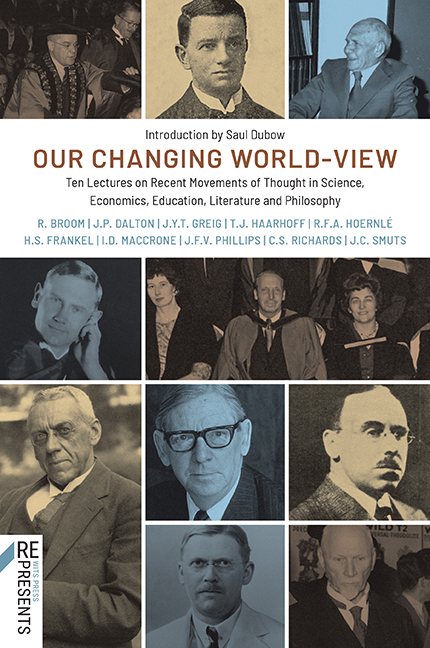 Our Changing World-View
Our Changing World-View Book contents
- Frontmatter
- Contents
- Introduction
- Preface
- Miscellaneous Frontmatter
- 1 Some Recent Scientific Advances in Their Bearing on Philosophy
- 2 The Material World—Yesterday and Today
- 3 Evolution—Design or Accident?
- 4 Man at the Crossroads
- 5 Psychology in Perspective
- 6 Literature in the Machine Age
- 7 The Holistic Attitude in Education
- 8 Our Changing Economic World
- 9 Africa in the Re-Making
- 10 Old Truths and New Discoveries
4 - Man at the Crossroads
Published online by Cambridge University Press: 12 October 2021
- Frontmatter
- Contents
- Introduction
- Preface
- Miscellaneous Frontmatter
- 1 Some Recent Scientific Advances in Their Bearing on Philosophy
- 2 The Material World—Yesterday and Today
- 3 Evolution—Design or Accident?
- 4 Man at the Crossroads
- 5 Psychology in Perspective
- 6 Literature in the Machine Age
- 7 The Holistic Attitude in Education
- 8 Our Changing Economic World
- 9 Africa in the Re-Making
- 10 Old Truths and New Discoveries
Summary
”… Mankind is once more on the move… The tents have been struck, and the great caravan of humanity is once more on the march…”—General Smuts.
As a botanist is a student of plants, it could with justice be asked why I should select a theme obviously transgressing the barriers of the vegetable kingdom. Let me explain, therefore, that on this occasion I speak not as the orthodox botanist, but rather as the ecologist—one who sets himself the fascinating, if difficult, task of peering into the secrets of the interrelations of all forms of life, one with the other, and with the stage on which they have their being, the environment; one who tries to take the synoptic point of view as regards the implications and relations of knowledge won by specialists in biological and allied fields. To describe ecology as a sub-division of biology is to state a half-truth, is to miss the greater truth that ecology is an attitude towards facts and their meaning, a point of view aiming at combination and blending of rays from various facets, to produce a harmony of light and colour, a picture of life as a whole. In essence, the ecological attitude toward the material of biology is equivalent to Smuts’ holistic attitude toward the evidences of matter, life and mind in the infinitely vaster field of the Universe.
Born first in the minds of students of plants, up to the present bearing its richest fruit in botanical investigations, ecology has commenced to play an ever-increasing part in the study of animal life, and more recently has attracted the attention of some of those concerned with problems in the health and in the sociology of man. Among statesmen, in his seeing the inherent value of ecological concepts and criteria in attempts to understand group, national and international relations, General Smuts has been exceptional. As an ecologist, then, I venture to lay before you some of man's troubles, and thereafter certain truths, certain suggestions emergent from ecological studies, attempting at the same time to show their bearing upon some of the weighty problems facing us.
- Type
- Chapter
- Information
- Our Changing World-ViewTen Lectures on Recent Movements of Thought in Science, Economics, Education, Literature and Philosophy, pp. 69 - 100Publisher: Wits University PressPrint publication year: 2021


